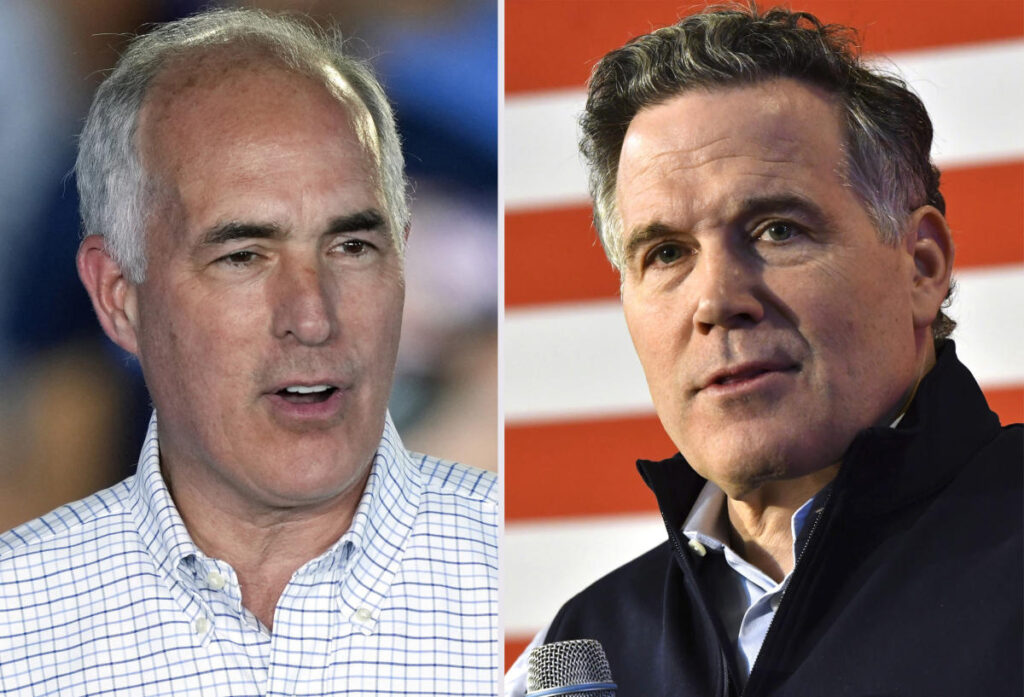In Pennsylvania, a crucial U.S. Senate race is heating up as Democratic incumbent Sen. Bob Casey faces off against Republican challenger David McCormick. With both candidates gearing up for their second debate, the stakes have never been higher, particularly with control of the Senate hanging in the balance. This race has drawn the attention and substantial financial backing of both parties, with tens of millions of dollars being funneled into campaign ads each week. During their first debate, Casey emphasized his portrayal of McCormick as a wealthy carpetbagger who profited at the expense of working-class Americans, while McCormick criticized Casey as an ineffective, career politician who aligns closely with President Biden and Vice President Harris.
Senator Bob Casey, 64, is seeking a fourth term and touts his extensive experience, claiming it is his toughest reelection challenge yet. A well-known figure in Pennsylvania, Casey has actively supported Biden’s legislative initiatives, including the extensive $1.9 trillion pandemic relief package. He is celebrated for his strong allegiance to labor unions and has successfully won six statewide elections, making him Pennsylvania’s longest-serving Democratic senator. His campaign focuses on issues that resonate with many voters, including restoring the middle class, protecting abortion rights, supporting labor rights, and safeguarding voting rights. Casey consistently portrays McCormick, along with Donald Trump, as a threat to these values and aims to distinguish himself as a champion of the people.
In contrast, David McCormick, 59, is a former hedge fund CEO who previously ran unsuccessfully in the 2022 Republican primary against Dr. Mehmet Oz. His experience includes high-profile roles under President George W. Bush, notably as a Treasury undersecretary during critical economic times. McCormick is determined to push forward a pro-Trump agenda, advocating for extended tax cuts from 2017 and a stringent stance on immigration, which includes prioritizing deportation for undocumented immigrants with criminal records. Although he opposes abortion rights, he maintains that he would not support a national ban on abortion, offering a nuanced stance that aims to appeal to a broader electoral base.
As the race develops, discussions surrounding border policy and ongoing geopolitical issues, such as the Israel-Hamas conflict, are gaining prominence. Both candidates are actively addressing these subjects, reflecting their importance in shaping voter sentiment. Democrats currently hold a slim Senate majority, making the outcome of the Pennsylvania race critical as they face a challenging electoral map in 2024. The high stakes of this election have resulted in an unprecedented financial commitment, with more than $190 million already spent exclusively on this race. Experts estimate that the total expenditures may surpass $320 million by the time of the elections, demonstrating the significance both parties place on securing this pivotal seat.
The forthcoming 60-minute debate, set to air live from Philadelphia, is expected to draw considerable attention. Hosted by WPVI-TV, it will also be simulcast with Spanish translation on Univision, reflecting the diverse demographics of Pennsylvania. Streaming options will be available through multiple platforms, ensuring extensive reach to voters. Notably, both Casey and McCormick were unchallenged in securing their party nominations, but the race also features candidates from other parties, including John Thomas from the Libertarian Party, Leila Hazou from the Green Party, and Marty Selker from the Constitution Party, though these candidates were not invited to participate in the debate.
With the election timeline firming up and mail-in voting already underway, both candidates understand the urgency of effectively communicating their visions to the electorate. As the candidates prepare for a critical showdown, they are aware that every word and gesture could sway undecided voters in a race that has already become one of the most expensive in U.S. history. The narrative being shaped in this race will likely extend beyond Pennsylvania, as the outcome has implications for party control in the Senate, impacting national legislation and governance. The debates and the discussions that follow will play an essential role in defining the candidates and their positions in what promises to be a highly competitive election season.

